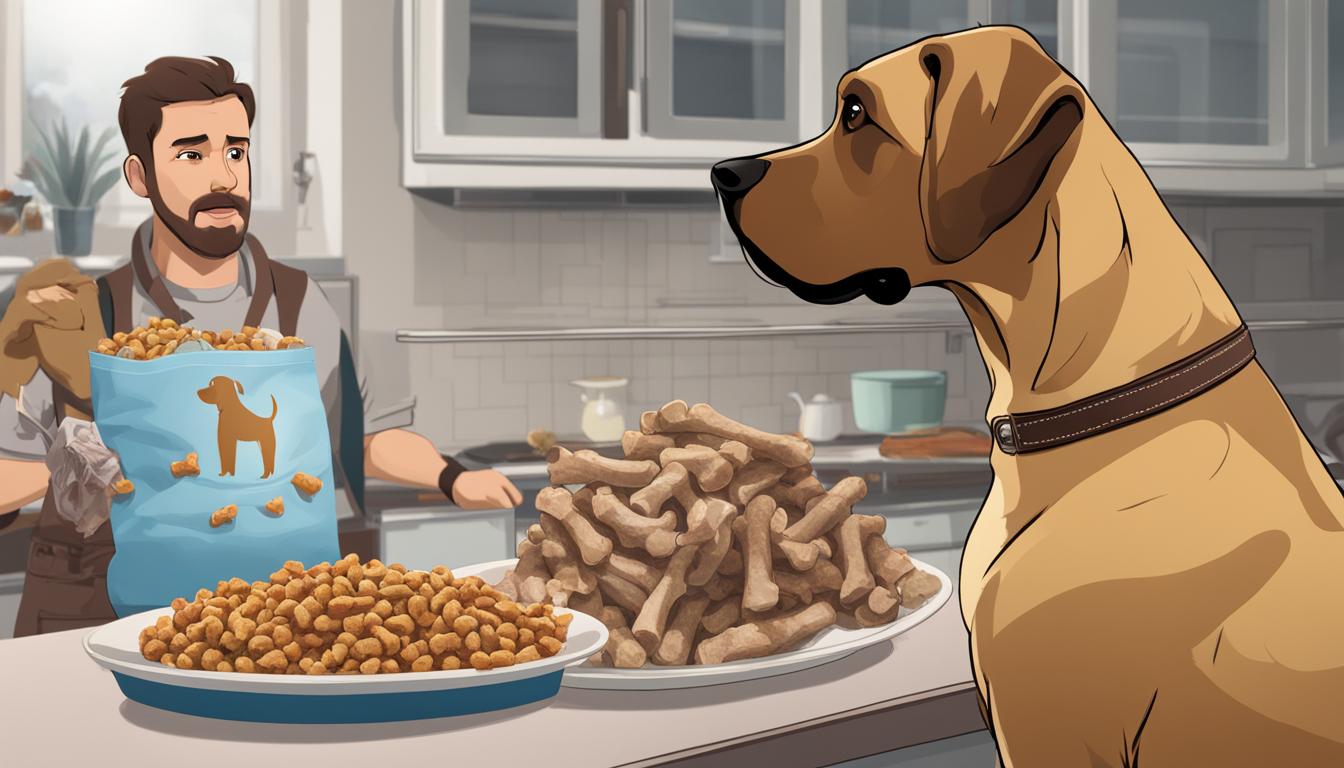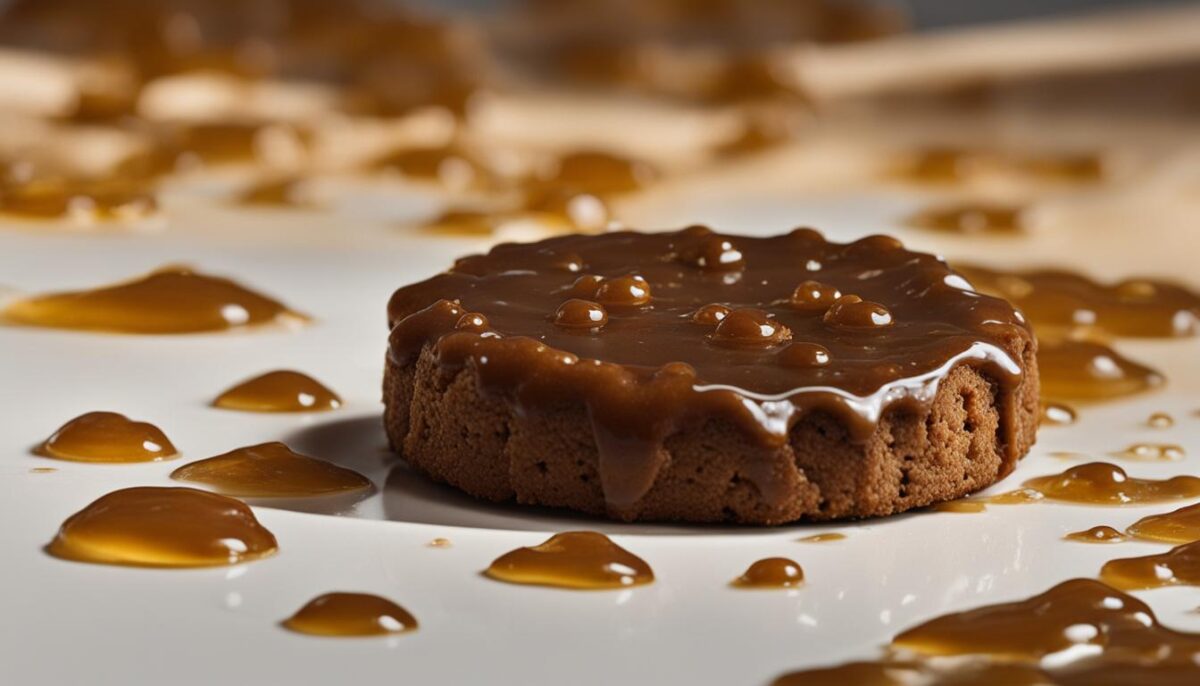Are you unsure about whether chicken fat is bad for your furry companion? As pet owners, we want the best for our dogs, especially when it comes to their health and nutrition. In this article, we will explore how chicken fat affects dogs’ health and if it’s a good protein source for our pets. Let’s explore the world of dog diets, ingredients, and the role of fats in their well-being.
The Importance of Fats in a Dog’s Diet
Fats are important in a dog’s diet because they help with important processes in the body. They help make cell membranes, absorb vitamins, balance hormones, and control inflammation. Eating some chicken fat provides important fatty acids, like Omega-6 and Omega-3.
Dogs need Omega-6 fatty acids for healthy skin and coat. Omega-3 fatty acids help brain development and health. When you add chicken fat to your dog’s food, it provides them with essential fatty acids.
Remember, moderation is crucial when adding chicken fat or any fat to your dog’s diet. Too much fat can lead to excessive calorie intake and nutrient imbalances. To figure out how much fat is right for your dog, talk to your vet about their health and diet.
Table: Omega-6 and Omega-3 Fatty Acids in Chicken Fat
| Fatty Acid Type | Content in Chicken Fat |
|---|---|
| Omega-6 | High |
| Omega-3 | Moderate |
To keep your dog healthy, include a little chicken fat in their well-balanced diet.
Finding the Right Balance of Fat in a Dog’s Diet
Finding the right balance of fat in your dog’s diet is crucial for their health and well-being. Dogs need fats for energy and nutrients, but too much or too little can be bad for them. To keep your dog healthy, it’s crucial to know how fat affects their diet. Make smart choices about the fat in their food.
When it comes to treats, it is important to choose those with a moderate fat content. You should only give your dog a small amount of treats each day. The treats shouldn’t make up a big part of their calories. Excessive fat intake from treats can lead to weight gain and other health issues.
It’s important to add fats to your dog’s food and watch how they react. Some dogs can have stomach problems, such as upset stomachs or diarrhea, if they eat high-fat foods. Introduce fat into your dog’s diet and observe how it affects their digestion.
| Treat | Fat Content |
|---|---|
| Chicken Jerky | 10% |
| Peanut Butter Biscuits | 8% |
| Carrot Sticks | 1% |
Recommended Treats with Moderate Fat Content
-
Choose treats with a fat content of around 5-10% to maintain a balanced diet for your dog.
-
If you want to avoid gaining weight, don’t eat treats that have a lot of fat.
-
To prevent digestive issues, keep an eye on your dog’s digestion and adjust their treats.
To keep your dog healthy, choose treats with moderate fat content and balance their diet. To make sure your dog stays healthy, ask your vet for advice on their diet.
The Healthiest Sources of Animal Fats for Dogs
Consider your dog’s specific needs and potential allergies when choosing animal fats. Most dogs can handle chicken fat, but some may have allergies to chicken protein. If your dog is allergic to or sensitive to chicken, avoid chicken fat. Choose other healthy fats instead.
Many dog foods have chicken fat, so owners should check labels for allergies. If you think your dog is allergic to chicken, talk to your vet. They can help you find healthy fats for your dog.
It is important to note that not all high-fat foods are beneficial for dogs. Fats give energy and help the body work, but eating too much makes you gain weight and have health issues. To keep your dog healthy, make sure their diet includes the right amount and kinds of fats.
Table: Comparison of Animal Fat Sources
| Animal Fat Source | Benefits | Potential Allergies |
|---|---|---|
| Chicken Fat | Rich in essential fatty acids | Potential allergies for dogs with chicken sensitivities |
| Beef Fat | Good source of vitamins and minerals | Uncommon, but possible allergies for dogs with beef sensitivities |
| Fish Oil | High in Omega-3 fatty acids for healthy skin and coat | Potential allergies for dogs with fish sensitivities |
| Coconut Oil | Aids in digestion and supports immune function | Rare, but possible allergies for dogs with coconut sensitivities |
To find the best fats for your dog’s diet, talk to your vet about healthy options. They can give you advice on what to feed your dog based on their health and allergies.
Balancing Omega-3 and Omega-6 Fatty Acids
To keep your dog healthy, it’s important to have a good mix of Omega-3 and Omega-6 fats. Chicken fat has Omega-6 fatty acids for skin and coat health, but balance with Omega-3 is important. Dogs need omega-3 fatty acids. These acids reduce inflammation, keep skin healthy, and support functions.
Fish is a good source of omega-3 fatty acids. Adding fish to your dog’s diet can improve skin, reduce itchiness, and boost the immune system. Adding raw chicken to your dog’s diet can provide a balanced ratio of Omega-3 and Omega-6 fatty acids. Chicken meat has both of these essential fats.
The Benefits of Balanced Fatty Acids:
-
Healthy skin and coat
-
Reduced itching and inflammation
-
Improved brain function and cognitive health
-
Support for the immune system
The levels of Omega-3 and Omega-6 fatty acids in your dog’s diet will vary based on their health needs. Talking to your vet can help find the right balance for your dog’s unique needs.
| Food Source | Omega-3 Fatty Acids | Omega-6 Fatty Acids |
|---|---|---|
| Fish oil | High | Low |
| Salmon | Medium | Low |
| Flaxseed | High | Negligible |
| Chicken fat | Low | High |
As you can see from the table, chicken fat is a higher source of Omega-6 fatty acids compared to Omega-3 fatty acids. Adding fish oil or flaxseed to your dog’s diet can balance Omega-6 levels. To keep your dog healthy, make sure to give them a mix of different healthy fats. This will give them all the essential fats they need.
Keep in mind, this info is a general guide and may not be suitable for dogs with health issues or special diets. Before making any big changes to your dog’s diet, always consult your veterinarian.
The Risks of Cooked Fat for Dogs
Feeding dogs cooked fat is not recommended. When heat and oxygen expose fats, they may become rancid and lose their nutritional value. When dogs eat bad fats, it can lead to inflammation and health problems. These problems include liver and heart issues, arthritis, and cell damage. To keep dogs healthy, don’t give them cooked fats because it can be risky. Instead, give dogs natural sources of healthy fats and make sure their diet is balanced.
Some foods have cooked fats, like fried food, processed meat, and leftover fatty meals. These fats are often high in unhealthy trans fats and can cause harm to a dog’s health when consumed. To keep dogs safe, avoid these foods and give them nutritious dog food for energy.
To make sure your dog gets enough fats in their diet, you can add a little fish oil or flaxseed oil. Natural sources of fat can give you Omega-3 fatty acids without the risks of cooked fats. Also, select dog food that uses natural animal fats rather than cooked fats.
| Common Sources of Cooked Fats in Human Foods | Potential Health Risks for Dogs |
|---|---|
| Fried foods | Increased inflammation, liver and heart problems, arthritis |
| Processed meats | Cell damage, unhealthy trans fats |
| Fatty scraps from cooked meals | Potential weight gain, nutrient imbalances |
The Importance of Natural Sources
When it comes to fats in a dog’s diet, it is crucial to focus on natural sources over cooked fats. Dogs can stay healthy with natural sources like chicken fat, fish oil, and flaxseed oil. To keep your dog healthy, choose healthier alternatives instead of cooked fats. This helps maintain their vitality. Remember, always consult with your veterinarian for personalized dietary recommendations for your dog.
It is important to moderate the incorporation of fat into a dog’s diet. Excessive fat intake can lead to weight gain and other health issues. To keep your dog healthy and happy, it’s important to find the right balance of fats. You should also check their health. This ensures they get the nutrition they need.
The Truth About Canine Pancreatitis
Keeping a balanced and healthy diet is crucial for a dog’s well-being. Many people think all fats cause pancreatitis in dogs, but several factors cause it. If you feed dogs a lot of fatty food or give them spoiled fats, they might get pancreatitis. Some dog foods have unnatural ingredients that can stress the pancreas during digestion.
So, what can you do to keep your furry friend’s pancreas healthy? The key lies in providing a balanced diet that includes appropriate levels of fats. Select nutritious dog treats to maintain a healthy digestive system and prevent pancreatitis. Avoid high-fat foods.
Note that not all fats are equal, and some fats can be healthier for your dog than others. When choosing treats or meal options, be mindful of their fat content. Opt for healthy diets that promote well-being and avoid excessive fat consumption. By doing this, you can keep your dog’s coat healthy and help them stay vibrant and strong.
Table: Common Causes of Canine Pancreatitis
| Cause | Description |
|---|---|
| High-fat diet | Feeding dogs a diet that is excessively high in fat can put a strain on their pancreas, increasing the risk of pancreatitis. |
| Ingesting rancid fats | Rancid fats can lead to widespread inflammation and health issues in dogs, including pancreatitis. |
| Stress on the pancreas | Unnatural ingredients found in some commercial dog foods, such as grains and starches, can put stress on the pancreas, contributing to the development of pancreatitis. |
To keep your dog healthy, learn about pancreatitis and give them a balanced diet. To keep your dog happy and healthy, remember to choose treats and food.
Conclusion
To ensure your dog’s health, consider the type of food you feed them. The type of food you pick for your dog, whether regular or dry, can impact their health.
To choose healthy options for your pet, it’s important to read and understand food labels. When picking dry dog food, choose a good kind that has important nutrients and less fat. Choosing dry dog food is a convenient and balanced option for your dog’s diet. It usually has the right amount of fats and other important ingredients.
You can keep your dog’s skin and coat healthy by choosing nutritious food for them. Always talk to your vet about what to feed your dog and any allergies they might have. You can make sure your pet stays happy, energetic, and healthy with the right approach.
FAQ
Is chicken fat bad for dogs?
Chicken fat, in moderation, can be a beneficial source of essential fatty acids for dogs.
Are all fats important in a dog’s diet?
Fats in a dog’s diet play a crucial role and take part in various important processes in the body.
How can I find the right balance of fat in my dog’s diet?
To keep your dog healthy, read food labels and pick dog foods that have appropriate fat levels.
Can chicken fat cause allergies in dogs?
Some dogs can be allergic to chicken fat, especially if they are sensitive to chicken protein.
Should I balance Omega-3 and Omega-6 fatty acids in my dog’s diet?
Yes, maintaining a proper ratio of Omega-3 and Omega-6 fatty acids is crucial for a dog’s health.
Is feeding dogs cooked fat recommended?
No, giving dogs cooked fat can cause health problems. It’s better to give them natural healthy fats.
Is it the fat alone that can cause pancreatitis in dogs?
Eating too much fat and rancid fats cause pancreatitis.
What should when feeding my dog a balanced diet?
To keep your dog healthy, feed them a balanced diet, check food labels, and check their health.


